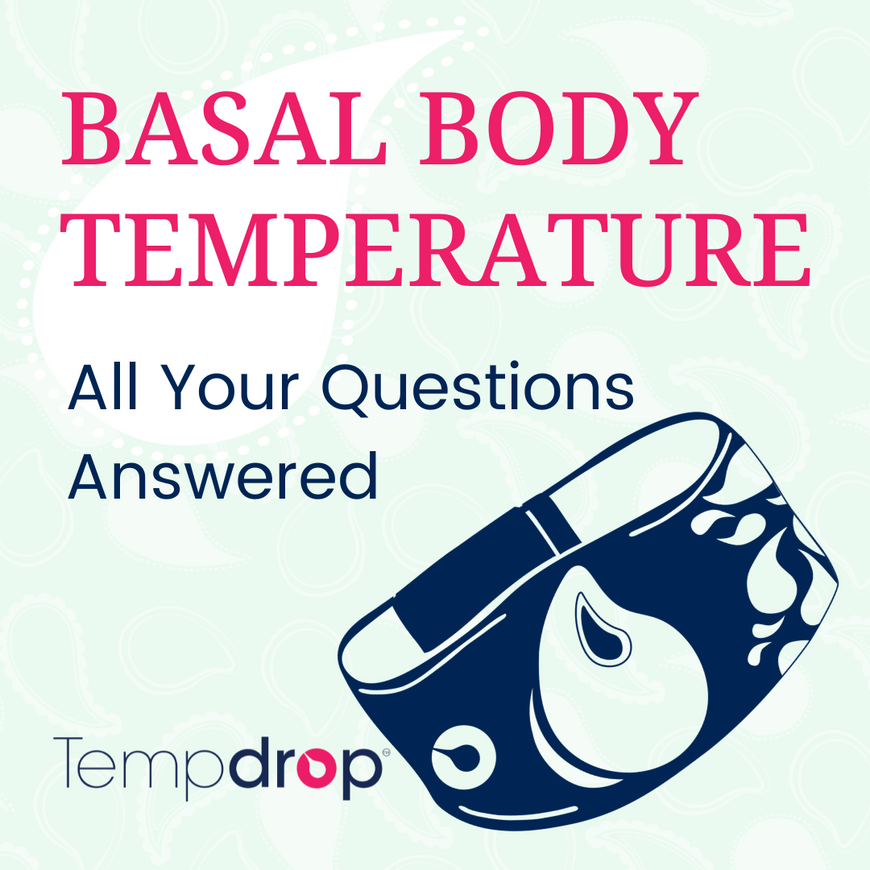Written by Nathalie Daudet
Basal body temperature (BBT) is one key piece in charting your fertility signs with a fertility awareness method, which is essential for any intention of family planning, as well as tracking your health. We asked our users what their burning BBT questions were, and we answered!
(Psst: This is the first part in a series about basal body temperature. You can find Part 2 here and Part 3 here!)
When is the best time to take my BBT?
BBT is your body’s lowest temperature attained during rest (for most people, overnight sleeping). BBT rises in the second half of the cycle (after ovulation), this is due to the presence of the hormone progesterone. The best time to take your temperature with an oral basal body thermometer is after at least three hours of consecutive sleep, before you get out of bed to go to the bathroom, cuddle your partner, take a drink of water, or fall back asleep. But with Tempdrop, it's much simpler. You can keep your armband on while you get up to go to the bathroom or tend to your baby. It won't disturb your temperatures, and it isn’t necessary to temp at the same time every day - Hello lazy mornings!
What is rounding? And does it matter that much?
- Rounding in Celsius is rounding to the nearest .05 or .00.
- For Fahrenheit, some people do the same and scientifically round to the nearest .00.
- Because the difference between degrees in Fahrenheit is different, you can also just drop the last digit (also known as truncating).

Is it really essential to try and pinpoint exact ovulation point? I can’t see a clear thermal shift from one half of my cycle to the other. The exact peak temp is difficult to spot.

If you are having a hard time seeing a clear thermal shift, that’s okay! It sometimes takes a bit of practice to have the “eyes” to see a clear shift. Ensuring you round your temps will take some of the guesswork out if it. You want to look for a higher range of higher temperatures, and more specifically for your shift, one higher temperature that is higher than the previous 6 days. This high temperature should stay above your coverline, that is the line that indicates the difference between your low pre ovulatory temperatures and higher postovulatory temperatures.
Why don’t many physicians believe in BBT charting?! I’ve had to search for someone who actually took it seriously!
You know, I wish I knew the answer to this myself! Many doctors don’t take fertility awareness methods of birth control seriously, and by extension, may not take charting your BBT seriously. Good on you for searching for someone who supports your decision to chart your cycles, because you don’t want to waste your time convincing someone of something that you know for yourself, and thousands of other women, works. Basal body temperature is a wonderful objective measure of ovulation, and for that reason it is easy to show that you have ovulated.
What does it mean if my BBT dips during my luteal phase?
Some people believe a BBT dip in the luteal phase is an implantation dip, but we've debunked that myth! In short, one of the most common reasons for a basal body temperature dip in the luteal phase is due to a surge of estrogen. Estrogen is the dominant hormone the follicular (pre-ovulatory) phase of the cycle. Progesterone is dominant during the luteal (post-ovulatory) phase of the cycle. This isn't to say estrogen isn’t hanging around during the luteal phase. Sometimes it can rise a little bit during the luteal phase, especially right after ovulation, causing your temperature to dip.
Can room temperature and pajamas worn at night affect my BBT?

With oral basal body thermometers, room temperature can definitely raise or lower BBT. Make a note in your chart if you suspect something like room temperature will affect your BBT. Wearing pajamas, extra blankets, or even a heated blanket making you feel significantly warmer or colder than your normal could theoretically affect your basal body temperature.
If you have a Tempdrop, you don't need to worry about variances in room temperature. The design of Tempdrop is built around having an accurate temperature no matter what circumstances you're temping in! It filters out the "noise" in the environment (in this case, room temperature, etc.).
As mentioned above, this series continues in Part 2 and Part 3! In the meantime, do you have more questions? If so, go ahead and ask them on Tempdrop's Instagram!

Nathalie Daudet is a social worker and FEMM instructor based in Winnipeg, Canada. She discovered fertility awareness after searching high and low for a non-hormonal method of birth control. After learning the magic of fertility awareness and the gift of body literacy, she decided to pursue formal fertility awareness training and share the knowledge of fertility awareness with women looking for a natural birth control option. Fertility Awareness Project is the hub for Nathalie’s FEMM classes in both group and individual formats, online and in person in Winnipeg. If you love this post and would like to thank Nathalie, shop Tempdrop with Nathalie's unique referral link.

